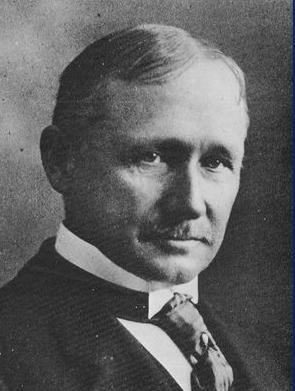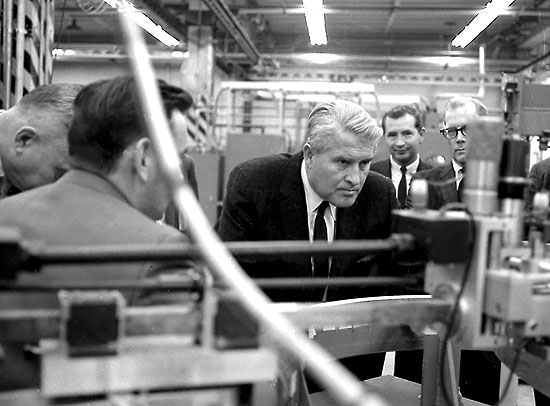Taylorism
by Andrew Boyd
Today, Taylorism. The University of Houston's College of Engineering presents this series about the machines that make our civilization run, and the people whose ingenuity created them.
The early twentieth century witnessed the end of the second industrial revolution. In the United States, vast corporations appeared. And management faced a problem: how to run these behemoths.
 Enter Frederick Winslow Taylor. Taylor worked for many years in heavy manufacturing. At Midvale Steel Works, he worked his way up the job ladder: laborer, shop clerk, gang boss, foreman, and finally chief engineer.
Enter Frederick Winslow Taylor. Taylor worked for many years in heavy manufacturing. At Midvale Steel Works, he worked his way up the job ladder: laborer, shop clerk, gang boss, foreman, and finally chief engineer.
What Taylor experienced along the way disturbed him. The way jobs were done varied wildly from person to person. Some people were quite proficient. Others weren't. So after leaving Midvale, Taylor devoted the remainder of his life to stomping out inefficiency — in thoughtful, systematic ways. And in doing so, he gave birth to scientific management, also known as Taylorism.
At the core of Taylor's philosophy was a belief that any job could be studied, and that best practices could be learned and taught. If one man could make three pairs of shoes in a day and another only two, why? Prior to Taylor, the answer was simply the skill of the craftsman. Taylor agreed but went further, asking what managers could learn from a skilled craftsman and encapsulate for others. In Taylor's words, management had "laws as exact and clearly defined as the fundamental principles of engineering."
Taylor was intently focused on 'maximum prosperity,' which he called 'THE principle object of management.' Maximum prosperity meant both lower costs for businesses and higher wages for laborers. And the recipe for achieving both was the elimination of inefficiencies.

While Taylor demonstrated concern for laborers, he advocated a strong hand by management. Managers were keepers of the flame, tasked with understanding what worked best and making sure employees applied best practices. In an ideal world, labor and management would realize this arrangement benefitted everyone. But by nature humans don't like to be bossed about. Taylor knew this from his many years of experience. But in his obsession with efficiency, he treated laborers as cogs in a great machine; a machine greased and tuned by manager-engineers. Today, many historians refer to Taylor's philosophy as "enlightened despotism."

Taylor's ideas were quite influential in the 1910s and 1920s, though by the 1930s they'd been usurped by other theories of management. But Taylor's primary theme, that management can be treated as a science, endures to this day.
I'm Andy Boyd at the University of Houston, where we're interested in the way inventive minds work.
Notes and references:
Scientific Management. From the Wikipedia Web site: https://en.wikipedia.org/wiki/Taylorism. Accessed February 1, 2011.
F. W. Taylor. Shop Management. New York: Harper & Brothers, 1912.
F. W. Taylor. The Principles of Scientific Management. New York: Harper & Brothers, 1913.
S. P. Waring. Taylorism Transformed: Scientific Management Theory Since 1945. North Carolina Press, 1991.
The picture of F. W. Taylor is from Wikimedia Commons. All other pictures are from U. S. government Web sites.